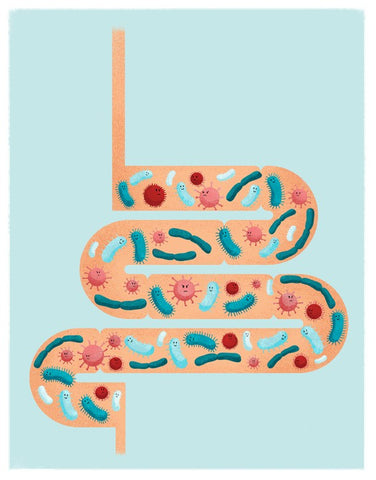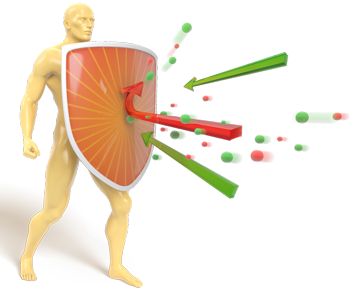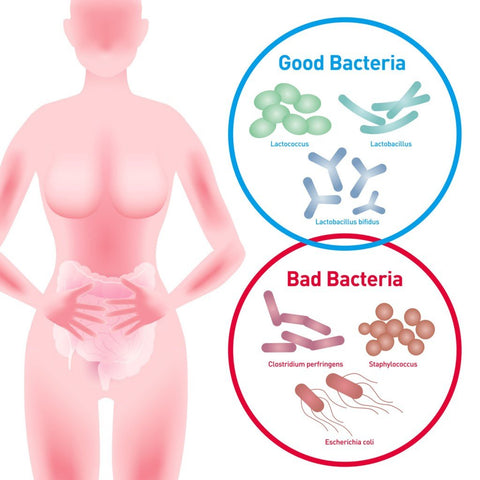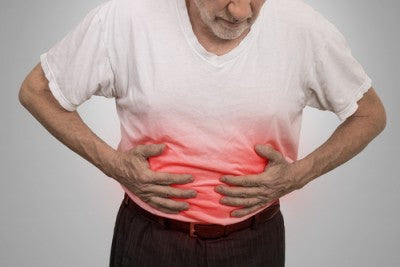Your Cart is Empty
Good Bacteria vs Bad Bacteria: What’s the Difference?

All bacteria are bad, right? Wrong!
When we think of bacteria, we often think of germs and disease-causing bugs. This is only partly true: most of our body is made up of good bacteria! In fact, we have more bacterial cells than human cells. We’re covered in bacteria – they live on our skin, in our eyes and ears. But most of them live in our gut.
You might already know that your mouth is connected to your stomach by a long passage called the gastrointestinal tract (GIT). The GIT is lined with a vast community of microorganisms known as “gut bacteria”. It’s also referred to as “gut flora” or “microbiota”. We humans have larger numbers of bacteria in our gut than anywhere else in our bodies.

It’s believed that around 500 to 1,000 species of bacteria live in our GIT, all of which play different roles in general health and wellbeing. Many of these species are established almost as soon as we’re born, and they change and proliferate as we grow and develop. The average human body contains around 1.5kg of bacteria!
The health of our gut flora is hugely dependent on our diet. Other factors are also important, particularly our lifestyle, genetics, environment, medications, health conditions and even psychological factors. Every one of us has a different gut bacteria profile because everything we come into contact with can affect it – our health history, diet, age, genetics, gender and even the air we breathe. This is also why our gut bacteria is constantly being altered.
At any one time, our gut will contain both good and bad bacteria. The trick to staying healthy is to maintain a healthy balance of the two – that is, more good bacteria than bad. It’s estimated that only 10% of bacteria are disease-causing, while the remaining 90% is good.
What Does Good Bacteria in the Body Do?
It was Hippocrates, the father of medicine, who first said, “All disease begins in the gut”. What he meant was that our health is largely dependent on the health of our gut bacteria.
Good Bacteria Are Needed For:
1. Healthy Digestion
Gut bacteria are an essential part of the digestive process. The huge varieties of bacterial species living in the intestines and colon are there to break down the food you eat. They do this using a special process called fermentation.
Foods that haven’t been broken down in the stomach – such as dietary fiber – are sent to the large intestine in their undigested form. This is where colonic bacteria get to work fermenting it. Fermentation produces nutrients that the body can use for energy production and a number of other functions. More than half of the fiber we eat is broken down by colonic bacteria.
Anything left over (i.e., that hasn’t been broken down) is passed out in the stool. This is why fiber is great for bulking out the stool and preventing constipation.

2.Protecting us from invading microbes
Most of our immune system is in our gut – in fact, more than 70 percent of it. Scientists know that the cells lining our gut interact with both our innate and adaptive immune systems[1], playing a major role in different aspects of immune system development and function. Put simply, our gut is the first line of defense between our internal body systems and the diseases of the outside world.
Any pathogens that enter your body – for example, through food you eat, air you breathe or objects you touch – has to get several defense systems before they can enter your bloodstream. The gut is the first. This is very important considering that much of the food we eat contains a lot of bacteria – no matter how healthy it is!
But thanks to the amazing work of the bacteria lining our GIT, any bacteria that may be harmful to our body is fought off before it can enter our bloodstream and make us sick.
3. Providing Nutrients and Antibodies
The fermentation process in the large intestine produces valuable enzymes and nutrients to support various bodily functions.[2] These enzymes help in the digestive process, while the nutrients include B vitamins, vitamin K and short-chain fatty acids. All of these byproducts of fermentation are required by the body for energy production, tissue repair and maintenance, brain function and hundreds of other processes.
Our gut bacteria are also constantly working to protect our body from incoming pathogens. One of the ways they do this is by secreting huge quantities of antibodies into the gut, helping the body to control the interaction between our bodily functions and diseases we might encounter in everyday life.

Examples of Good Bacteria
These strains of bacteria have been shown to benefit the gastrointestinal tract, which in turn benefits our overall health and wellbeing.
- Lactobacillus acidophilus: for optimal nutrient absorption and good digestive function
- Lactobacillus gasseri:beneficial for weight loss[3]
- Lactobacillus plantarum: boosts the immune system
- Bifidobacterium lactis: promotes healthy balance of bacteria
- Bifidobacterium longum: aids removal of toxins
With all this is mind, it’s no wonder that keeping our gut bacteria in tip-top condition is hugely important to our overall health. Healthy bacteria mean a healthy you.
Unfortunately, the reverse is also true: bad bacteria means a not-so-healthy you.
What is Bad Bacteria?
Most of us don’t think about the health of our gut bacteria until we get sick. Unfortunately, by this time much damage may have already been done.
Bad gut bacteria include yeasts, parasites, fungi and certain bacterial species that cause harm to the body. Some may destroy the delicate lining of the gut by feeding upon it or by releasing toxins that cause inflammation and damage. Some may cause digestive problems by disrupting the natural fermentation processes in the gut, causing gas and constipation.
Certain types of yeast may proliferate to the point of crowding out the good bacteria in the gut. This causes an imbalance of good and bad bacteria, ultimately resulting in the effects of the bad bacteria eclipsing those of the good. Worst of all, these effects will mitigate benefits provided by the good bacteria. Food will not be digested properly, which means we cannot absorb nutrients from our diet.
What Does Too Much Bad Bacteria Do?
Alterations in gut bacteria can lead to all sorts of problems such as:

1. Poor Digestion
Indigestion, constipation or diarrhea are typical symptoms of excess bad bacteria. If untreated, these problems can develop into illnesses such as irritable bowel syndrome, gastroenteritis,
Candidiasis (yeast overgrowth) and even serious conditions such as inflammatory bowel disease. Other disorders linked to gut dysbiosis include arthritis, asthma, autism, type 2 diabetes, heart disease, metabolic syndrome, mood disorders, fatty liver disease and even Parkinson’s disease.
2. Fatigue or a General Lack of Energy
Our body’s supply of energy comes from the food we eat – and in order to that obtain energy, the food must be broken down through the bacterial fermentation process in the gut. However, if our gut is rife with bad bacteria, the food won’t be broken down properly. This ultimately deprives the body of its main energy source, not to mention all the other nutrients it needs to obtain from the diet. Not only that, the poorly-fermented food will sit in the colon, releasing toxins that can further compromise your health. If this continues over a long period of time, we gradually become more and more fatigued.
3. Low Mood or Depression
Research has shown that gut bacteria has a significant influence on mental and emotional health. The gut-brain axis refers to the line of communication between our enteric nervous system and our brain. Bad gut flora has a major impact upon our thoughts, emotions and mood. If the gut is inflamed, bloated or uncomfortable in any way, the cells lining our gut sends this information to the brain – which in turn impacts upon our mood. Discomfort caused by an imbalance of gut bacteria can be both caused by and contribute to low mood. This also means that irritation in the GIT may result in signals to the CNS that influence mood.
Other Signs of Bad Bacteria
These are the typical signs that you have an excess of bad bacteria in your gut:
- Gas, bloating
- Abdominal pain and cramping
- Diarrhea, constipation or alternating between both
- Constant cravings for sugar and/or starchy foods
- Joint pain or stiffness
- Skin rashes or itching
- Bad breath
- Low mood or depression
- Food intolerances
Examples of Bad Bacteria
- Salmonella
- Shigella
- Yersinia
- Vibrio cholerae
- Campylobacter
- Certain strains of E. coli
Does Good Bacteria Kill Bad Bacteria?
Along with all other bodily functions that good bacteria are needed for, their most important one is to keep levels of harmful bacteria at a minimum. Research has shown that our body’s immune system is a key player here. In a study published in the journal Immunity, it was reported that a special type of protein in our white blood cells works to maintain balance of healthy bacteria in the gut.[4]
This protein is referred to as ID2. When ID2 is missing from the immune system, bad bacteria tend to proliferate. It’s thought that this protein enables our immune system is able to recognize harmful bacteria that enters the gut, thus allowing it to attack.
This finding led researchers to suggest that promoting the growth and development of good bacteria in the gut may be more effective in killing off bad bacteria than taking antibiotics.
How to Keep a Healthy Balance of Good Bacteria
The secret to overall health and wellbeing is to maintain high levels of good bacteria in the gut. This doesn’t have to be difficult or expensive. A large part of it comes down to what we eat and what we don’t eat.
-
Take Probiotic Supplements
The word ‘probiotic’ comes from the Greek word pro, meaning “promoting”, whilst biotic means “life.” Substantial research shows that probiotic supplements are one of the easiest and most efficient ways to restore the balance of healthy gut bacteria. Probiotic supplements are available in health stores as freeze-dried bacteria in powder, capsule, or tablet form. Choose a product with a high number of guaranteed ‘live’ bacteria, as these provide the best chance of colonization in the gut. Look for products that contain at least 20 million+ bacteria and have multiple strains of bacteria species, including Lactobacillus and Bifidobacterium.
-
Eat Foods Containing Good Bacteria
While the thought of food containing bacteria may sound terrible, it’s best food to support a healthy gastrointestinal environment. They do this in two ways. Fermented foods such as sauerkraut, kimchi and kefir contain high amounts of bacteria that produce lactic acid. These types of bacteria play a major role in the fermentation process. In the gut, these bacteria also help to maintain a level of acidity that prevents the growth of bad bacteria, while allowing good bacteria to thrive.
-
Avoid Foods That Increase Bad Bacteria
Many foods that are readily available these days are the type that destroy good bacteria and encourage the growth of ‘bad’ bacteria. Processed foods, junk foods, fizzy drinks, alcoholand even large amounts of coffee can wreak havoc on the gut. These foods are typically high in refined sugar, saturated fat and artificial additives such as coloring or flavors: all of which tip the balance in favor of bad bacteria.
More Good Bacteria Means Less Bad Bacteria
The health of our mind, body and every cell within us is dependent on the health of our gut bacteria. When we are ill, it’s likely that bad gut bacteria are to blame. Fortunately, it’s entirely possible to reverse this!
The benefits of good digestion, a strong immune system and a stable mind are only obtainable through nourishing the gut. Numerous scientific studies have shown that restoring and maintaining a healthy gut can be as simple – and efficient – as including probiotics and fermented foods in the diet. Remember – all disease begins in the gut!
Using tested weight loss probiotics from recent clinical studies, we at Better Body Co. have formulated a 3-strain probiotic supplement called Provitalize.
Provitalize users are healing their gut while reporting to lose as much as 5 pounds within a week, even without any major change in their diet or lifestyle.
English

